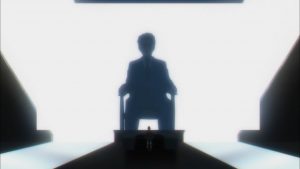 You can say many things about Boogiepop wa Warawanai – and I know, because I have. But one thing stands out as obvious to me, and it’s that this series is pretty much unique, and so is the experience of watching it. It’s fitting that Warawanai had 18 episodes because, well- that’s just weird, and so was everything about this production. Honestly, when was the last time we saw an anime with an 18-episode run – or 17, or 19? I’m sure there are other recent examples but I can’t think of any at the moment.
You can say many things about Boogiepop wa Warawanai – and I know, because I have. But one thing stands out as obvious to me, and it’s that this series is pretty much unique, and so is the experience of watching it. It’s fitting that Warawanai had 18 episodes because, well- that’s just weird, and so was everything about this production. Honestly, when was the last time we saw an anime with an 18-episode run – or 17, or 19? I’m sure there are other recent examples but I can’t think of any at the moment.
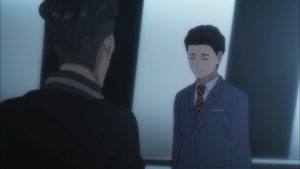 There are certain shows about which I’ve waxed so expansively over the course of their run that by the time we get to the finale, I don’t have a lot of bases not already covered in big piles of words. Boogiepop has inspired me to think in symbolic terms more than any series in a long time (which I consider a good thing), which always gives more grist for the writing mill come the weekend. It’s a meditative experience, no question, watching this series. I really do think it begs to be interpreted like a song more than any other type of narrative prose – the things it makes you think and feel are more important than the events themselves.
There are certain shows about which I’ve waxed so expansively over the course of their run that by the time we get to the finale, I don’t have a lot of bases not already covered in big piles of words. Boogiepop has inspired me to think in symbolic terms more than any series in a long time (which I consider a good thing), which always gives more grist for the writing mill come the weekend. It’s a meditative experience, no question, watching this series. I really do think it begs to be interpreted like a song more than any other type of narrative prose – the things it makes you think and feel are more important than the events themselves.
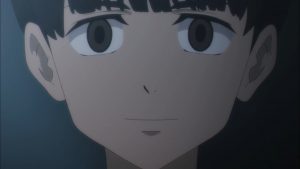 Because this is such a non-traditional series, with a non-traditional narrative, it only makes sense that it should have a non-traditional finale. Each arc of Warawanai has had an ending, but none of them felt like a true series finale – because of course, none of them have been as far as the novels are concerned. “King of Distortion” was no different. Even setting aside the unorthodox way the arc itself ended (which I’ll get to in a bit) it felt no more like the last episode of the story than any of the others.
Because this is such a non-traditional series, with a non-traditional narrative, it only makes sense that it should have a non-traditional finale. Each arc of Warawanai has had an ending, but none of them felt like a true series finale – because of course, none of them have been as far as the novels are concerned. “King of Distortion” was no different. Even setting aside the unorthodox way the arc itself ended (which I’ll get to in a bit) it felt no more like the last episode of the story than any of the others.
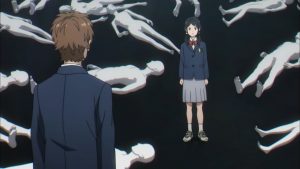 Here’s my take on that. Because Boogiepop tends to have characters pop in and out of the story, filling different roles at different times, one walks away with the sense that we’re merely seeing our paths cross with theirs, and that they’ve been living in their own lives in the meantime. So how the heck do you end a series like that? There aren’t any traditional protagonists or antagonists here in the larger sense, and everything in Boogiepop is about motion rather than stasis. To try and manufacture an ending that implied closure would have been unfaithful to the spirit of the narrative – and Natsume Shingo and Madhouse have been nothing if not faithful to that spirit.
Here’s my take on that. Because Boogiepop tends to have characters pop in and out of the story, filling different roles at different times, one walks away with the sense that we’re merely seeing our paths cross with theirs, and that they’ve been living in their own lives in the meantime. So how the heck do you end a series like that? There aren’t any traditional protagonists or antagonists here in the larger sense, and everything in Boogiepop is about motion rather than stasis. To try and manufacture an ending that implied closure would have been unfaithful to the spirit of the narrative – and Natsume Shingo and Madhouse have been nothing if not faithful to that spirit.
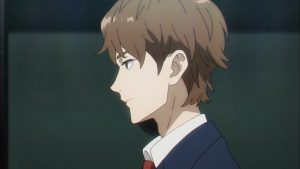 That faithfulness has caused a disconnect with the modern audience, I have no doubt (which we’ll be reminded of when the disc sales numbers come out). But almost more than any other series I can think of, Boogiepop would have been compromised by compromise – the fragile mythology it’s built would have tumbled like a house of cards. Yes, it was a pioneer in the light novel movement but that’s more symbolic than anything – what matters is that the story Kadono Kouhei is telling here wouldn’t have worked with a traditional modern anime (never mind LN) narrative.
That faithfulness has caused a disconnect with the modern audience, I have no doubt (which we’ll be reminded of when the disc sales numbers come out). But almost more than any other series I can think of, Boogiepop would have been compromised by compromise – the fragile mythology it’s built would have tumbled like a house of cards. Yes, it was a pioneer in the light novel movement but that’s more symbolic than anything – what matters is that the story Kadono Kouhei is telling here wouldn’t have worked with a traditional modern anime (never mind LN) narrative.
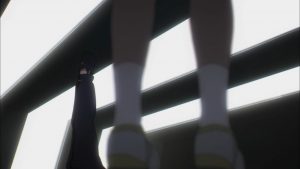 So in that context, the ending of “King of Distortion” makes a whole lot of sense. There was no real conflict in the end, no reckoning, because it wasn’t necessary. Yes, Tanaka Shirou was the King of Distortion. And it seems as if being the KoD was a special ability (evidence he’s super-evolved, I assume) rather than a distinct second presence in his body. What that says about Boogiepop/Touka is subject to interpretation – they may be the same, or they may be different. I still tend to think Boogiepop is a distinct entity from Touka rather than a “manifestation” of a power (where does she hide the outfit otherwise? Could be an illusion I suppose…).
So in that context, the ending of “King of Distortion” makes a whole lot of sense. There was no real conflict in the end, no reckoning, because it wasn’t necessary. Yes, Tanaka Shirou was the King of Distortion. And it seems as if being the KoD was a special ability (evidence he’s super-evolved, I assume) rather than a distinct second presence in his body. What that says about Boogiepop/Touka is subject to interpretation – they may be the same, or they may be different. I still tend to think Boogiepop is a distinct entity from Touka rather than a “manifestation” of a power (where does she hide the outfit otherwise? Could be an illusion I suppose…).
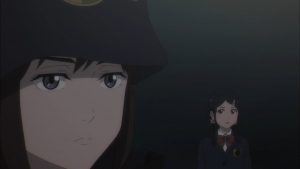 But in Tanaka’s case it seems clearly to be a facet of the boy himself – one brought on by guilt over his perceived role in the death of Kamikishiro Naoko. It’s Nittoki-san who more or less figures this out, and eventually she, Boogiepop and Shirou have a reckoning atop the Moon Temple. This is where, is a conventional show, the gunfight at the O.K. Corral would have taken place. But instead they talk, debate – and it’s clear Boogiepop isn’t interested in taking Shirou down. “Are you evil?” Boogiepop asks, and in doing so shows us what he believes the answer to be. In a sense Boogiepop is saying “You just need to get this out of your system” to Shirou – though there’s an unmissable message that he’ll be keeping an eye on the King of Distortion, and is ready to step in if necessary.
But in Tanaka’s case it seems clearly to be a facet of the boy himself – one brought on by guilt over his perceived role in the death of Kamikishiro Naoko. It’s Nittoki-san who more or less figures this out, and eventually she, Boogiepop and Shirou have a reckoning atop the Moon Temple. This is where, is a conventional show, the gunfight at the O.K. Corral would have taken place. But instead they talk, debate – and it’s clear Boogiepop isn’t interested in taking Shirou down. “Are you evil?” Boogiepop asks, and in doing so shows us what he believes the answer to be. In a sense Boogiepop is saying “You just need to get this out of your system” to Shirou – though there’s an unmissable message that he’ll be keeping an eye on the King of Distortion, and is ready to step in if necessary.
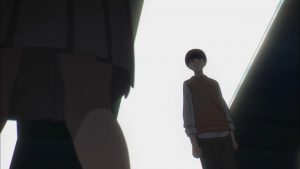 As usual there are no real answers here. We don’t really know where the normal human ends and the alter ego begins, or to what extent these are part of the host’s psyche or something more. Or indeed if these abilities are latent in all of us just waiting for a trigger, or whether (for now at least) only very exceptional people have them. Or how much that matters, or who started the Touwa organization. But it’s not really about the answers, this series, and if you and I came up with exactly the same interpretation of all this I suspect Kadono would think he’d failed at his job.
As usual there are no real answers here. We don’t really know where the normal human ends and the alter ego begins, or to what extent these are part of the host’s psyche or something more. Or indeed if these abilities are latent in all of us just waiting for a trigger, or whether (for now at least) only very exceptional people have them. Or how much that matters, or who started the Touwa organization. But it’s not really about the answers, this series, and if you and I came up with exactly the same interpretation of all this I suspect Kadono would think he’d failed at his job.
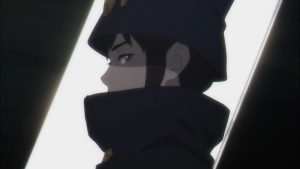 It’s easy to slip the nostalgia goggles on and say that Boogiepop reflects a time when light novels were better (pssst – they were) but that’s not really the point here. The main thing is that Boogiepop wa Warawanai was a singular viewing experience in 2019 – an anime redolent of what anime sci-fi used to be like, and for that alone I’d be glad it exists. But there’s also the fact that it made me appreciate this old franchise in a much more profound way, the skill Natsume displayed in putting this series together, and Yuuki Aoi’s spectacularly unconventional and subtle performance as Boogiepop.
It’s easy to slip the nostalgia goggles on and say that Boogiepop reflects a time when light novels were better (pssst – they were) but that’s not really the point here. The main thing is that Boogiepop wa Warawanai was a singular viewing experience in 2019 – an anime redolent of what anime sci-fi used to be like, and for that alone I’d be glad it exists. But there’s also the fact that it made me appreciate this old franchise in a much more profound way, the skill Natsume displayed in putting this series together, and Yuuki Aoi’s spectacularly unconventional and subtle performance as Boogiepop.
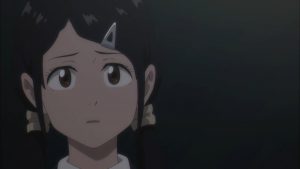 It was a slow build for me, but this series ended up being one of the best of the winter season – one that challenged me as few shows do and stayed with me after viewing long after most would have faded away. If this is indeed the last we see of Boogiepop in anime (as I strongly suspect it will be) I’m very glad that another generation of fans has had the opportunity to experience Boogiepop in a form that’s so true to the essential nature of the series – whether they collectively appreciate that as much as they should or not.
It was a slow build for me, but this series ended up being one of the best of the winter season – one that challenged me as few shows do and stayed with me after viewing long after most would have faded away. If this is indeed the last we see of Boogiepop in anime (as I strongly suspect it will be) I’m very glad that another generation of fans has had the opportunity to experience Boogiepop in a form that’s so true to the essential nature of the series – whether they collectively appreciate that as much as they should or not.


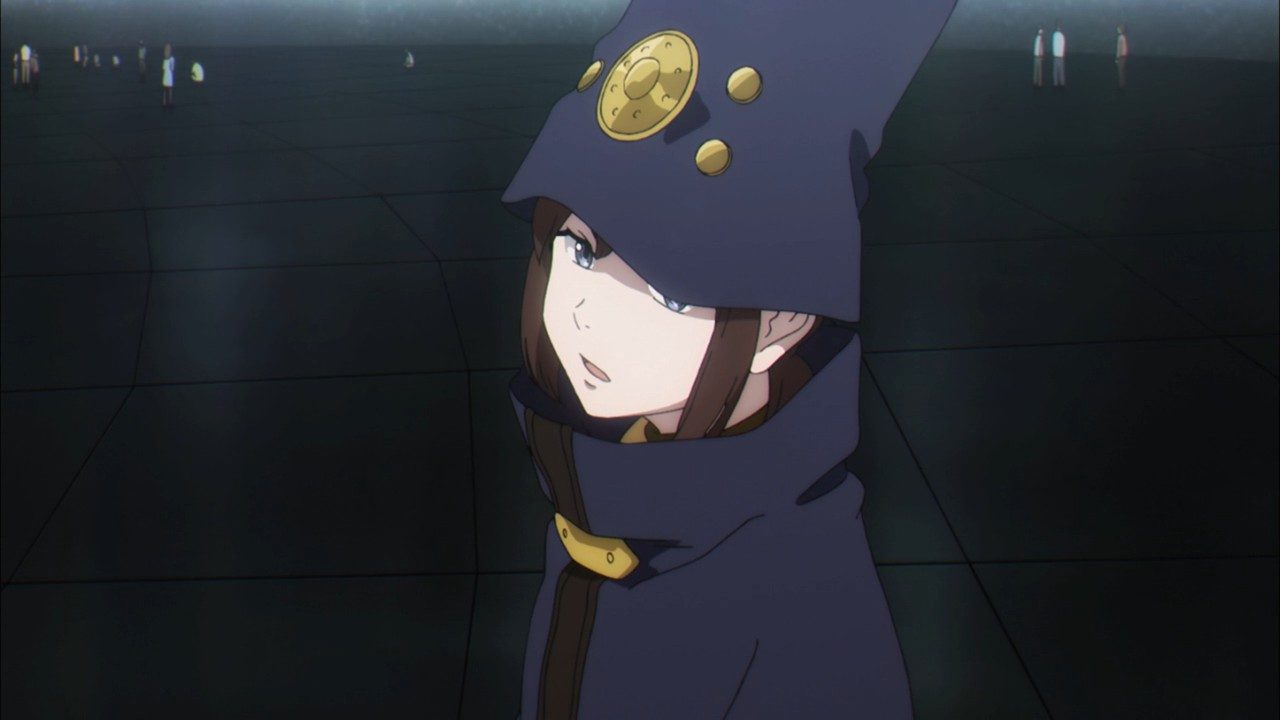
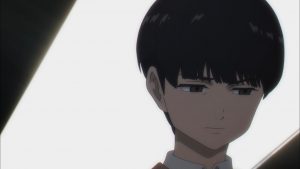
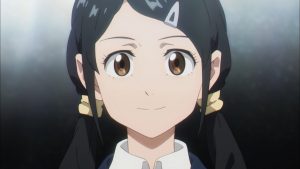
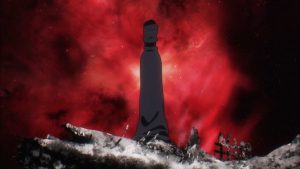

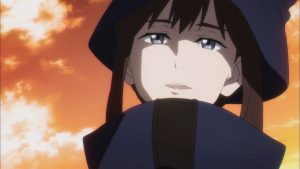
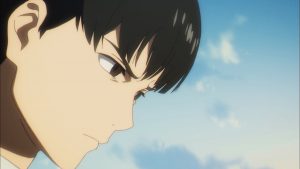
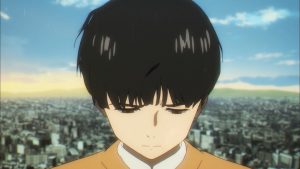
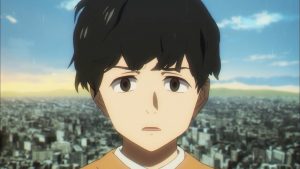
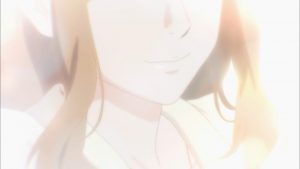
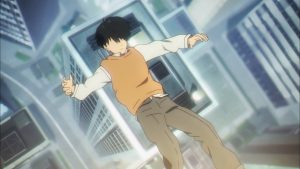
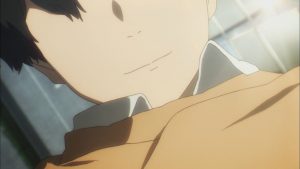
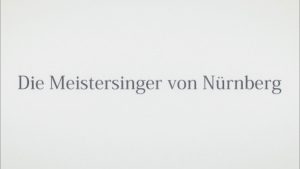
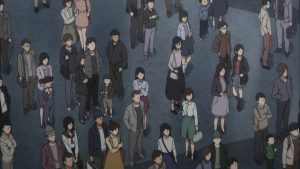
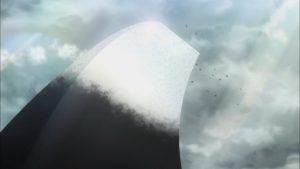
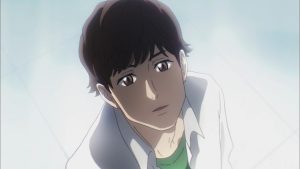

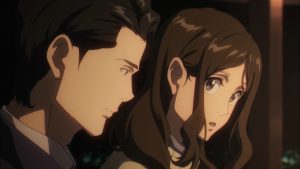
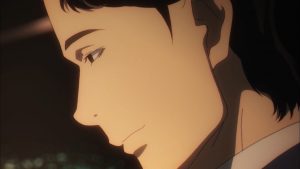
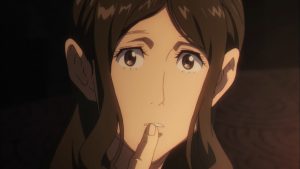
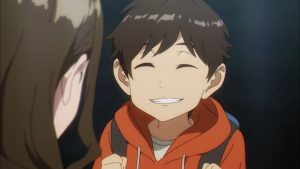
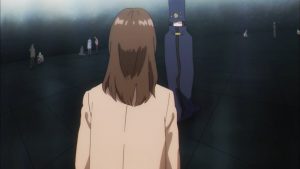
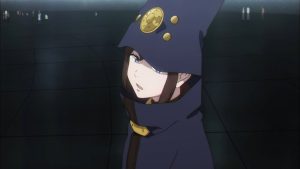
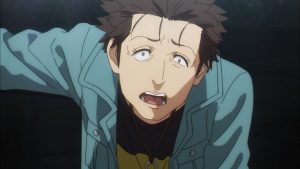
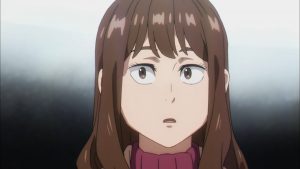
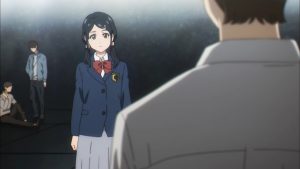
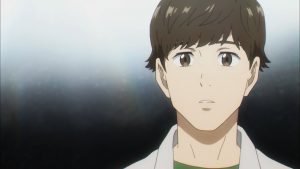
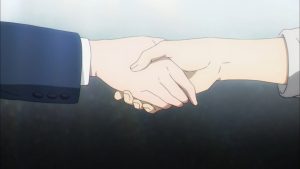
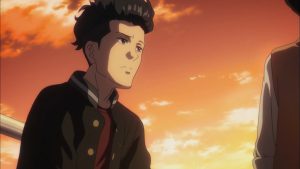
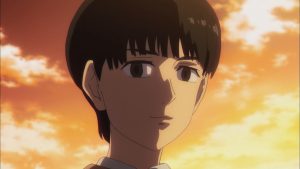
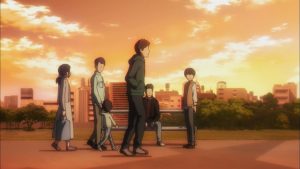
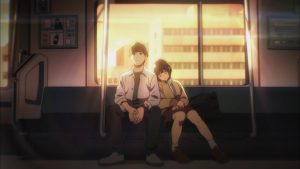
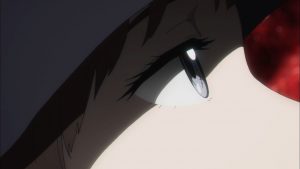
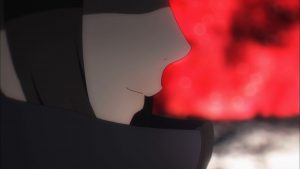
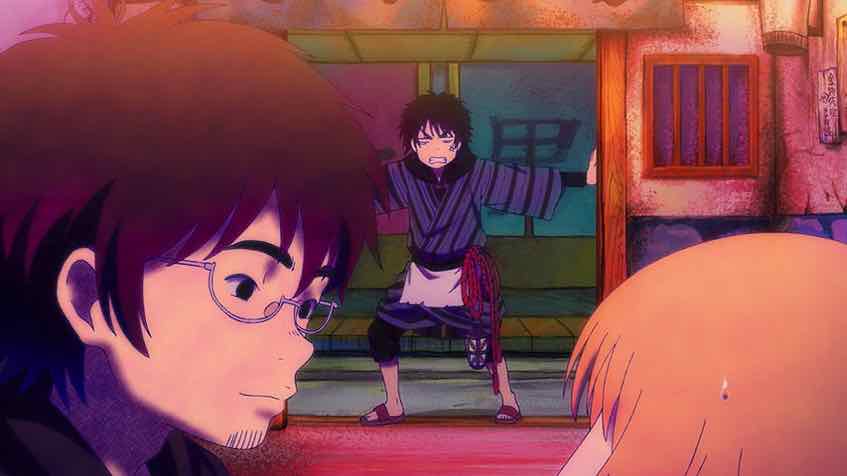
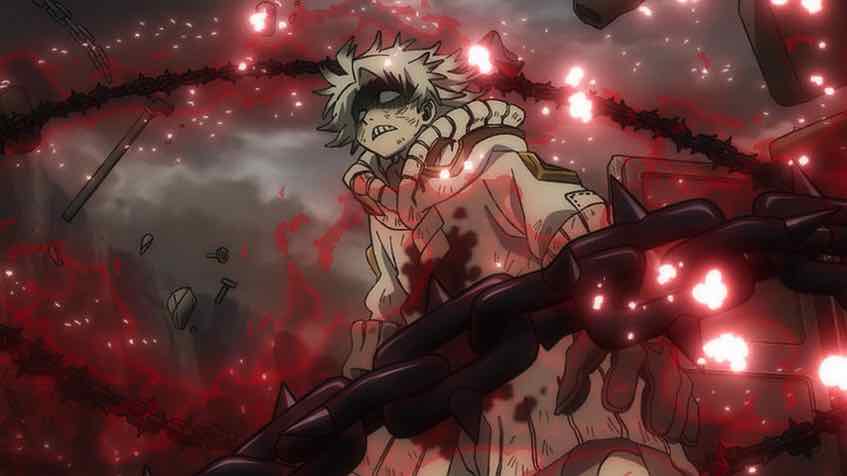
JJ
April 1, 2019 at 12:09 amThis adaptation was practically everything I could ask for. The contemplative tone and essentially obfuscated nature of the novels was kept intact from beginning to end.
It’s almost a shame that it shared a season with perhaps the only two series this year that I will have enjoyed more.
TheYepMan
April 1, 2019 at 2:06 amGod, I loved this. And I want more! And I mean, there’s a LOT of source material yet untouched. Even just a movie of Pandora in the Mirror (I mean, we had Eugene show up in this arc after all) would be great.
Guardian Enzo
April 1, 2019 at 7:55 amIt’s not a question of material but commercial considerations, IMO. I doubt there’ll be the will to fund any more – I think bringing back Boogiepop for a new generation was a noble experiment but this will be as far as it goes. Hope I’m wrong.
DP
April 1, 2019 at 3:43 amJust want to throw in my two cents in agreement. For all of its enigmatic style, in the end, Boogiepop hit me as a deeply emotional experience, particularly the fantastic Boogiepop at Dawn arc. For me, the first episode of that arc, giving us Nagi’s backstory, has been the single best anime episode of the year so far.
I also want to second your opinion of Aoi Yuuki’s performance. She was spectacularly good, and in my opinion, is by far the best voice actor working in anime today.
Guardian Enzo
April 1, 2019 at 7:56 am“Dawn” and “Imaginator” were the two best arcs for me. And totally opposite stylistically.
Jon
April 1, 2019 at 7:23 amFor an angular series like Boogiepop, the characters feel ridiculously human. Niitoki’s bravery and strong-headedness, Scarecrow’s connection with Nagi, the Fear Ghoul herself suffering from fear in her final moments, Pigeon’s hypocrisy of blaming Mo Murder for Scarecrow’s death (despite being tasked to convey orders from Towa herself)…
It is a series that will stay with me a very long time. Thanks again for covering it to the end.
Some food for thought: At the beginning of the Boogiepop at Dawn arc, Echoes and Boogiepop ruminate on how the feelings and ideals of the deceased live on through the people who knew them, helping them for the better. In the King of Distortion arc, most of the dreams we see involve the characters meeting the people already gone from their lives one last time (e.g Teratsuki for the mother, Masumi for Niitoki). And in most of these meetings, some kind of contentment and understanding was reached.
Wagner’s music swells through the building, free of fear, christening those who have faced their feelings. Compare this to the Fear Ghoul who wished to die with this track playing in the background,. It’s almost like everyone was being reborn in some way. And Niitoki talks with Keiji in the building, giving her lingering feelings a proper closure.
If there was a connecting theme to this series, I think this may be it. It feels like a fitting counterpoint to how quickly characters move in and out of the narrative.
Scampi
April 1, 2019 at 10:58 amhttps://twitter.com/Madhouse_News/status/1111595481438650368
The Boogiepop outfit is kept in the bag Touka carries around. In my case I’m not particular about Boogiepop’s identity because it’s never been about the abilities but manifestation of mental issues or the cause of these issues. In Touka’s case Boogiepop itself is just a neutral superpower with omnipotence and insight and most importantly Aoi Yuuki taking the spotlight.
Jindujun93
April 1, 2019 at 3:07 pmYeah, the first novel specifies that Touka carries the outfit around in a bag, too. Basically whenever Boogiepop notices a threat around, Touka starts carrying the bag around without even realizing it herself.
donhumberto
April 1, 2019 at 9:16 pmJust finished it last night. What a great ride this has been. By far my favorite show of the season and a strong contender to be among my favorites of the year. I’d also like to add how spectacular (and perfectly used) the soundtrack was. Now time for a Boogiepop Phantom rewatch…
Rita
April 2, 2019 at 1:54 amA bygone era really does suit this series. While it’s actually very different from it, watching this put me in the mind of Serial Experiment Lain or Ergo Proxy, or heck even Haibane Renmei (which is actually like, arguably all the way over on the other side of the tonal scale) because, despite stylistic or tonal differences, all of them were series where I walked away without a clear ‘answer arc’ wrapping up all the loose threads or anyone making emphatic statements about who was right or what happened. I think introspective and open ended series in general seem to be less popular, though they still show up in josei and seinen adaptations, but the sort of truly abstract, up to interpretation, decipher the symbolism type series is something I haven’t seen in a while, which makes me pretty sad since I loved Lain and Haibane Renmei.
And if nothing else I’m really glad Boogiepop reminded me of them since until it did it occurred to me that I really hadn’t thought about them in years, because none of the stuff I watched recently ever triggered that sort of similarity comparison to those kinds of shows. So while I don’t doubt that it’s not as commercially successful, I really do hope it does interest some of the newer anime audience into looking for other shows like that, because I think that would be a pretty great result.
AYA
April 2, 2019 at 6:39 pmI actually have a lot of regret over this adaption. They rushed thing too much. The novel also got that ambigous, dream like quality of Sci Fi novel/manga of the earlier day like you said, but the structure is much tighter. For example, the first novel got a horrid adaption: Boogiepop is already a hard story to follow due to mutiple POV and non-linear timeline, but the anime shifted things around too much. Some of the “human” quality is lost due to the anime cut down things too. Boogiepop and Keiji’s relationship seems much closer in the novel, because they talked more, during a seemingly longer time, so it’s very clear at the end Keiji sees Boogiepop as his friend – as the only one he could share his loneliness and isolation ( as Keiji is the only one in his class decide to walk a different path and not applying for college.), anxiety about modern life and lot of random stuff… The anime makes an already complicated story much more confusing and harder to approach.
I love the voice actress of Boogiepop though. She’s awesome.